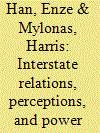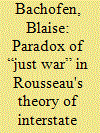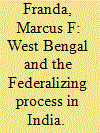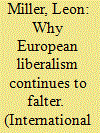|
|
|
Sort Order |
|
|
|
Items / Page
|
|
|
|
|
|
|
| Srl | Item |
| 1 |
ID:
079247


|
|
|
|
|
| Publication |
2007.
|
| Summary/Abstract |
The experience of recent years has amply demonstrated that no single
state or group of states has enough resources for imposing unipolarity.
This allegedly constructive simplification of interstate relations, based on a vertical hierarchy - however attractive this may seem - is utterly unrealistic. Unipolarity, quite simply, is an encroachment on God's prerogatives
|
|
|
|
|
|
|
|
|
|
|
|
|
|
|
|
| 2 |
ID:
047671


|
|
|
|
|
| Publication |
Steyning, Wilton Park, 1999.
|
| Description |
31p.
|
| Series |
Wilton Park Paper 145
|
|
|
|
|
|
|
|
|
|
|
|
Copies: C:1/I:0,R:0,Q:0
Circulation
| Accession# | Call# | Current Location | Status | Policy | Location |
| 043674 | 327.56/LAT 043674 | Main | On Shelf | General | |
|
|
|
|
| 3 |
ID:
130271


|
|
|
|
|
| Publication |
2014.
|
| Summary/Abstract |
Why do multi-ethnic states treat various ethnic groups differently? How do ethnic groups respond to these state policies? We argue that interstate relations and ethnic group perceptions about the relative strength of competing states are important-but neglected-factors in accounting for the variation in state-ethnic group relations. In particular, whether an ethnic group is perceived as having an external patron matters a great deal for the host state's treatment of the group. If the external patron of the ethnic group is an enemy of the host state, then repression is likely. If it is an ally, then accommodation ensues. Given the existence of an external patron, an ethnic group's response to a host state's policies depends on the perceptions about the relative strength of the external patron vis-à-vis the host state and whether the support is originating from an enemy or an ally of the host state. We present five configurations and illustrate our theoretical framework on the eighteen largest ethnic groups in China from 1949 to 1965, tracing the Chinese government's policies toward these groups, and examine how each group responded to these various nation-building policies.
|
|
|
|
|
|
|
|
|
|
|
|
|
|
|
|
| 4 |
ID:
140174


|
|
|
|
|
| Summary/Abstract |
In the Social Contract, Rousseau declares that he has given up the idea of discussing the “external relations” of states. Yet numerous texts—including a recently reconstituted work about the law of war—show that he thought very seriously about the question of the nature and origin of war and of the possibility of making war subject to the rule of law. Rousseau, in contrast to Hobbes, links war's appearance to that of the sovereign states; the state of war is therefore the necessary result of international relations. Moreover, he considers the international law as chimerical. How can he then conceive a non-utopian theory of “just war”? My hypothesis is that his conception of the law of war is deduced from principles of internal political law and arises from pragmatic necessity. The state that discredits itself in its manner of waging war weakens itself while believing that it is reinforcing itself.
|
|
|
|
|
|
|
|
|
|
|
|
|
|
|
|
| 5 |
ID:
144935


|
|
|
|
|
| Summary/Abstract |
The authors examine international missile attack monitoring and warning exchange services, and show the significance of information delivered by a warning system for the security of all countries without exception.
|
|
|
|
|
|
|
|
|
|
|
|
|
|
|
|
| 6 |
ID:
159289


|
|
|
|
|
| Summary/Abstract |
DESPITE their different geographical positions - one being a continental and the other an insular country - Russia and Japan are close neighbors. They are divided only by several kilometers of water, while bound together by an extensive network of ties and cooperation.
|
|
|
|
|
|
|
|
|
|
|
|
|
|
|
|
| 7 |
ID:
153128


|
|
|
|
|
| Summary/Abstract |
Existing literature contends that state capacity is an important variable that determines a country’s foreign policy behavior. Another strand of literature focuses on a more specific issue – the international relations of ethnic conflict, maintaining that domestic ethnic conflict may result in interstate conflict. In Southeast Asia, many weak states suffer from protracted ethnic conflict. However, few attempts have been made to assess the role of trans-border ethnic conflict in shaping interstate relations among the Association of South East Asian Nations (ASEAN) countries and the prospect of ASEAN security community. This article seeks to link the study of ASEAN with the issue of state capacity and internationalization of ethnic conflict. Deviating from existing literature, this article argues that the presence of trans-border ethnic groups in many ASEAN countries creates a common vulnerability, which in turn produces common interests and generates low levels of inter-state cooperation. Nevertheless, cross-border ethnic affiliations contribute to state leaders’ sense of insecurity and foment interstate mistrust. When the dynamics of ethnic politics in different countries interact, this interplay may add uncertainties to regional cooperation and inhibit the formation of a true security community. This article illustrates the above mechanism by examining the interaction between Malaysia and Thailand regarding the latter’s southern conflict.
|
|
|
|
|
|
|
|
|
|
|
|
|
|
|
|
| 8 |
ID:
025787


|
|
|
|
|
| Publication |
Princeton, Princeton University Press, 1968.
|
| Description |
vii, 257p.
|
|
|
|
|
|
|
|
|
|
|
|
Copies: C:1/I:0,R:0,Q:0
Circulation
| Accession# | Call# | Current Location | Status | Policy | Location |
| 009867 | 320.454/FRA 009867 | Main | On Shelf | General | |
|
|
|
|
| 9 |
ID:
131016


|
|
|
|
|
| Publication |
2014.
|
| Summary/Abstract |
With tl1e failed attempt to institute Liberalism in the aftermath of WWI it seemed the idealistic vision of perpetual peace, increased prosperity, and collective security was merely an unrealistic hope. However, the successful progression of the European Union from the European Coal and Steel Community and the European Economic Community began a new era of interstate relations. But, the repeated refusal of states to ratify the European constitution is a sign that European economic and policy integration is not enough to give Europeans a sense of shared values and principles and a sense of common heritage. The dissatisfaction over Europe's recent ?nancial woes--that were described as threatening a break-up of EU-has indicated that European Liberalism is faltering again. This article analyzes the issue from the perspective of peace research, global political economy, social psychology, and intercultural relations.
|
|
|
|
|
|
|
|
|
|
|
|
|
|
|
|
| 10 |
ID:
149252


|
|
|
|
|
| Summary/Abstract |
States frequently employ overt and covert foreign-imposed regime change (FIRC) to pursue their foreign policy interests. Yet there is little scholarship on the question of whether FIRCs improve relations between the states involved. In fact, most FIRCs either fail to reduce—or increase—the likelihood of militarized disputes between interveners and targets. Fundamentally, FIRC entails a principal-agent problem: foreign-imposed leaders rule over states with interests different from those of the intervener. Whereas the intervening state wants the new leader to pursue policies that reflect its interests, once in power, such leaders are focused on ensuring their political survival, a task that is often undermined by implementing the intervener's agenda. Foreign-imposed leaders who carry out the intervener's desired policies attract the ire of domestic actors. These domestic opponents can force the regime to reverse course or may even remove it from power in favor of leaders who are hostile to the intervener; in both cases, the result can be renewed conflict with the intervener. Rwanda's replacement of Mobutu Sese Seko with Laurent-Désiré Kabila in Zaire illustrates this problem.
|
|
|
|
|
|
|
|
|
|
|
|
|
|
|
|
|
|
|
|
|